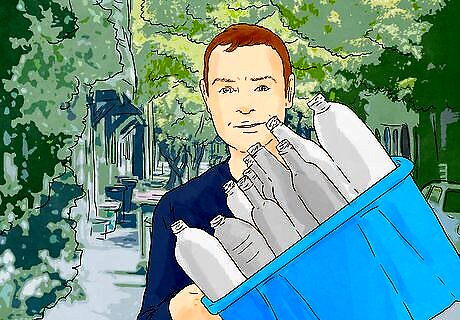
views
Being Happy about Yourself

Recognize your worth. Oftentimes, people depend on friends for validation of their feelings. You may think, “Sarah adores me, so I must be fabulous” or “At least I’m invited to all the parties.” Truth is, you should feel great about yourself regardless of who your friends are or how many you have. Learn to validate yourself instead of needing others to do it. For example, if you have always counted on friends to help you make big decisions, try to make a decision on your own by weighing pros and cons. If you think being needed by your friends makes you important, find other ways to feel important, such as reciting positive affirmations or volunteering.

Start a self-care regimen. Create a list of self-care activities that allow you to do something good for yourself. Start adding some of these activities to your calendar each day. Regular self-care can help you feel emotionally healthy—so you won’t have to rely on others to make you feel good about yourself. Try performing self-massage, doing a yoga routine, journaling, or taking your dog for a walk. You may also try listing all of the things that you like about yourself and reading over the list often.

Support your physical health and well-being. Show love to yourself by building a healthier lifestyle. Look for ways you can better support your health and wellness, such as cleaning up your diet, exercising more often, fighting stress, or getting adequate sleep each night. Start eating healthier by adding more vegetables to your meals, consuming less processed and junk foods, and drinking plenty of water. Start an exercise regimen that fits your lifestyle, such as walking your dog around the block, walking or running at a local park, or playing sports. Ease stress by doing relaxing activities like deep breathing or progressive muscle relaxation. Promoting physical health and well-being is something you should want to do for you simply because it helps you lead a more satisfying life.

Remind yourself of things you're grateful for. You may find yourself getting down about not having friends or feeding into negative thought patterns. Gratitude is a great practice to help you focus on the positives in your life instead of what’s going wrong. You’ll feel happier and satisfied about life. Start a gratitude practice where you note three things each day that went well or that you are thankful for. You can do this in a journal or you can download a gratitude app in your phone’s app store.
Keeping Yourself Busy

Learn to enjoy your alone time. If you loathe spending time alone, you’ll have a harder time being happy without friends. Make a commitment to start loving your alone time by spending it doing exciting activities. For instance, if you tend to think spending time alone is boring, come up with a list of fun activities you can do alone. Your list might include going to a concert, binge-watching a TV show, creating a DIY home project, starting a scrapbook, planting a garden, reading a book you have always wanted to read, and exploring new parts of your city or town. Each time you’re alone, use that time to cross something off your list. Over time, you’ll start to enjoy time spent alone.

Do what you love. The secret to a happy, fulfilling life is spending your days doing what you love. So, use your days to pursue your passions and interests. Think about ways you can add these activities to your daily life. For example, if you enjoy playing the piano, you might join a band or volunteer to play at your church. If you like writing, you might attempt to complete your first short story or novel.

Challenge yourself. Some people have a tendency to shy away from difficult things, but challenges actually help us to grow and enjoy life. Take a look at your life and find small ways to kick things up a notch. For example, if you have been doing the same workout routine for a year, switch things up by signing up for a new class or trying a new workout regimen.

Motivate yourself with powerful goals. Having something to look forward to is necessary to lead a satisfying life. Goals help give you a sense of direction in life and motivate you to keep pushing forward. Plus, once you cross the finish line, you’ll feel more accomplished and self-assured. Think of something you have put off in the past. Set a small, actionable goal relating to it and start working towards it today. For example, maybe you want to save money to travel the world. You’ll need to figure out how much money the trip requires and then devise a plan to save it within a given time-frame. Use some of your spare time to figure out the least expensive way to do this.

Keep learning. Stay busy and engaged with life by acting like a beginner in everything you do. Sign up for a class or read a book in which you can learn something completely new or even challenge old ways of thinking. For instance, you might explore religious principles different than your own, learn a new language, get a part-time job in an interesting industry, or listen to music or read books from a different genre.
Building Other Connections

Hang out with your siblings. If you have brothers and/or sisters, you have potential candidates for friendships. These people have known you your entire life and probably understand you a lot better than you think. Reach out to them and try to strengthen the bond you share. For example, if you have a sister that’s moved away to college, you might agree on a regular time to Skype one another and catch up. If your siblings still live nearby (or under the same roof), try to start a new tradition, like eating Sunday dinner together.

Spend quality time with your parents. If you don’t have friends, you can still have healthy relationships with other people in your life, particularly your parents. This relationship may not be one of equals, but you can share a hobby, express your feelings to them, and spend quality time with them. Get to know your mom and/or dad better and look for common interests. Ask questions, like “What’s your favorite TV show?” or “Would you like to see a game together this weekend?” Spend quality time with them by doing activities together like washing the car or sharing a meal.

Join a club or organization. Not having friends doesn’t mean you have to shut yourself off from the rest of the world. It also doesn’t mean you can’t try to be more social. Make an effort to connect with others who have similar interests by becoming a member of a club or organization. For instance, if you are creative, you might join the art club at your school or participate in the choir at your church if you like to sing.

Help out in your community. Volunteering is a great way to give back and forge new social connections with people in your area. You may not necessarily develop a friendship with these people, but spending time with them may help you feel less alone. Consider signing up to work in a soup kitchen, reading to children at the library, or organizing a cleanup event in your community.
















Comments
0 comment